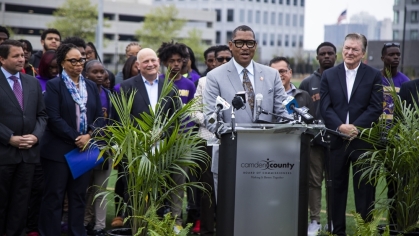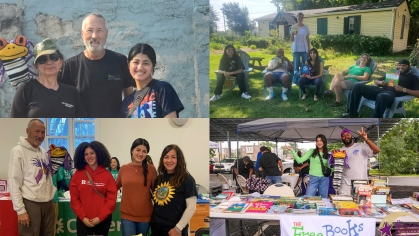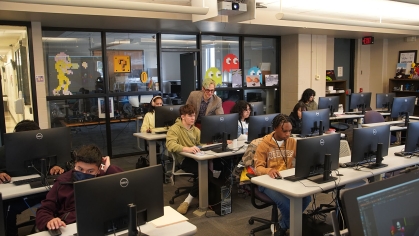Rutgers‒Camden Conversation with Medical Experts Informs Community of the Safety and Benefits of COVID-19 Vaccines

A conversation led by Camden native George Hill, a nationally renowned microbiologist and educator, enlightened city residents and Rutgers University‒Camden students, faculty, and staff about COVID-19 vaccines.
In “Reckoning with the Past and Building Trust: A Conversation about the COVID Vaccine and Black Communities,” Hill addressed concerns surrounding the COVID-19 vaccines in Black and Latinx communities during a Zoom discussion moderated by Tyshaneka Saffold, a Rutgers School of Nursing‒Camden assistant professor, on Tuesday, Feb. 23.
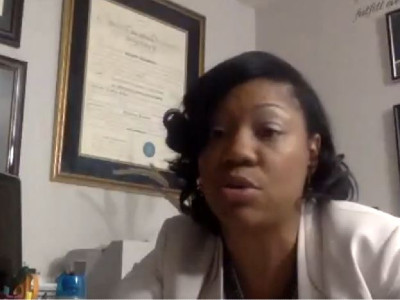
Tyshaneka Saffold, Rutgers-Camden assistant professor of nursing
In the 90-minute conversation, Hill explained why there are fears surrounding the vaccines, and shared information about the safety and benefits of the vaccines to help discussion participants overcome hesitancy about receiving a vaccine.
Because of the history of medical exploitation of African Americans in the United States and disparities in health care for minorities, Hill said that many Black people are apprehensive about receiving a COVID-19 vaccine.
In a Zoom classroom-like presentation, Hill, a professor emeritus at Vanderbilt University, shared that minorities have suffered the most deaths from COVID-19 in the United States. Black people top the list, with one in 602 dying from the disease, followed by one in 709 Hispanics. For whites, it is one in 862.
Hill explained that the vaccines work by causing the immune system to produce antibodies against virus proteins, and antibodies that bind to the spike protein could prevent virus from getting into the cells. Every vaccine requires confirmation that it is effective to vulnerable populations, and must be determined to be safe, said Hill. In addition, vaccine trials included participants from minority populations.
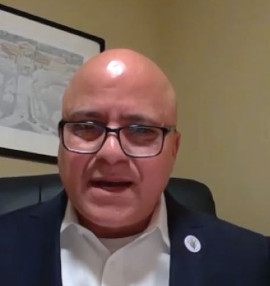
Camden Mayor Frank Moran urges residents to get vaccinated because they are at greater risk of becoming infected.
A graduate of Camden High School and of Rutgers University–Camden – and a member of the Rutgers Hall of Distinguished Alumni – Hill said that receiving a COVID-19 vaccine is similar to inoculations people have been receiving for diseases such as hepatitis, measles, and the flu.
In response to a discussion participant’s concerns about the efficacy of the COVID-19 vaccines, Hill said “Nothing is 100%.” Flu shots that are offered annually are estimated to be 60-70% effective. The COVID-19 vaccines currently available are 95% effective in preventing infection, which the Rutgers–Camden alumnus noted as being “better than 0%.”
In the City of Camden, nearly 10% of the population – 8,000 people – have tested positive for COVID-19. Roughly 150 Camden residents have died from the infection. Mayor Frank Moran, who has been inoculated, implored the city’s 77,000 residents to sign up to receive a vaccine because they are at greater risk of becoming infected. “We have a lot of individuals that live with multiple generations in one household,” said Moran. “We have many individuals that work in vulnerable positions.”

Jabril Oyeyemi, medical director of care management initiatives at the Camden Coalition of Healthcare Providers.
Jubril Oyeyemi, a physician and medical director of care management initiatives at the Camden Coalition of Healthcare Providers, shared results of a survey that shows two-thirds of Camden residents are less likely or extremely unlikely to get a COVID-19 vaccine. The respondents’ top concerns include not knowing enough about the vaccines, general safety worries, and unease due to a perceived lack of testing for the new vaccines.
“I see a lot of young people in their thirties and forties, who caught the infection, survived the infections, but now they have debilitating blood clots, chronic fatigue, heart palpitations,” said Oyeyemi. “We can’t take the risk of not getting the vaccine and hope ‘I don’t get COVID.’”
The Office of Civic Engagement, led by Nyeema Watson, vice chancellor for diversity, inclusion, and civic engagement, sponsored the conversation.
